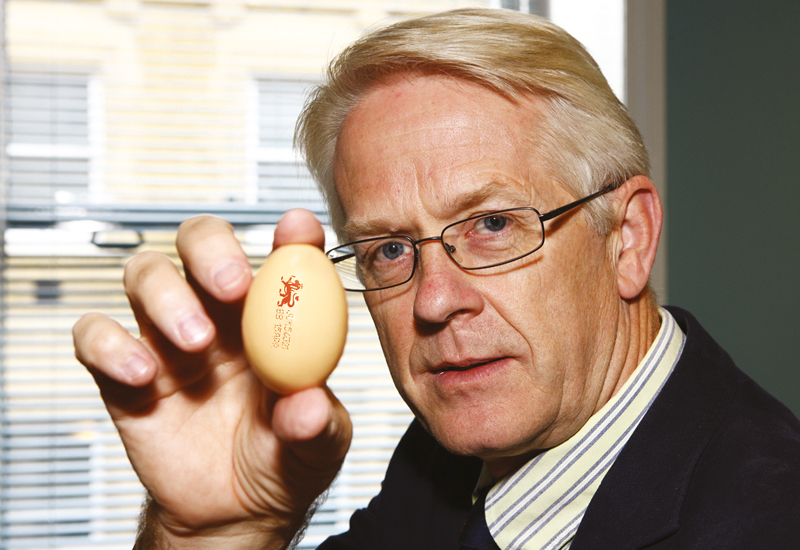
British Lion Eggs: Look for the Lion
Wholesalers warned by British Egg Industry Council (BEIC) to make sure they’re only selling British Lion eggs to ensure they’ve got the stamp of quality and safety
We spoke with Andrew Joret, Chairman, British Egg Industry Council (pictured above), and Sterling Crew, Independent Food Safety Adviser
Why is using only British Lion eggs so important?
AJ: The Lion scheme has been in operation for a long time and produces eggs that the Food Standards Agency (FSA) says can be eaten runny by vulnerable groups, which are pregnant women, infants and the infirm elderly. That’s quite a key accolade and really underscores the safety element of what Lion is about. Because of that, a lot of environmental health officers will recommend that business operators – as part of their due diligence – should be using Lion eggs.
British Lion eggs represent more than 90% of eggs produced in the UK and they meet the stringent standards of an independently audited Code of Practice, which covers more than 700 points across the whole production chain. It’s not just laying farms, it includes the hatcheries, the breeding flocks, rearing flocks and the packing centres where the eggs are graded, as well as supporting areas such as feed mills.
We also have a separate Lion Code for egg products, such as liquid egg, which, of course, must be made from Lion eggs.
Why is this better than importing eggs?
AJ: With shell eggs, you have the reassurance of the independently audited Lion Code of Practice, which is the most comprehensive egg safety programme anywhere in the world.
It’s vital if an operator or a retailer is serving or selling eggs to the public, particularly vulnerable groups.
With egg products, there can be some complacency with people assuming that, because they are pasteurised, they are safe.
But that couldn’t be further from the truth as there are various issues that aren’t resolved by pasteurisation, such as feed contamination.
Another key factor is that in the UK, if a flock was to test positive for salmonella, it would be slaughtered and removed from the food chain immediately. On the continent, that egg is sent to be pasteurised, which introduces a major risk of cross-contamination to the egg processing plant.
While pasteurisation kills salmonella in the majority of egg products, there is a significant risk around egg whites, which have to be heat treated at lower temperatures to maintain their functionality and still be usable for things such as making meringue.
So why’s this important for wholesalers to know?
AJ: As well as food safety issues with egg products, there have been ongoing issues with eggs produced in various countries abroad, including Spain and Poland among others.
A joint report from the FSA and FSS this summer backed this up, highlighting ‘significant’ food quality risks from the import of certain food products, including eggs.
The British Lion mark gives businesses and enforcement officers confidence that the eggs are safe, even if lightly cooked or used raw.
Specifying that only British Lion eggs can be used in a business’s food safety management system can also support a good food hygiene rating, giving customers an additional incentive to purchase.
SC: As an environmental health officer, if we’re going into your customers (restaurant or shop), or to see wholesalers themselves, a key thing we will look at is the egg sourcing due to the food safety risks. We’ll always look for the Lion mark because it’s an assurance that the due diligence has been done. If it’s not there, you have to ask a whole series of questions to try and get that assurance, and you still might not get it.
It’s great for wholesalers because the Lion says, ‘here’s a secure supply chain’. It’s also not just about food safety but also authenticity and provenance. You know it meets welfare standards, the quality is good and it’s got a best-before date too.
AJ: Awareness of the Lion is more than 80% and you’ll find that 99% of shops will only stock Lion eggs because that’s what the consumer wants and expects. In foodservice, while the customer won’t be able to see what eggs are being used, there’s the same expectation that due diligence has been done and that the eggs are safe for everyone to eat runny.
What can happen if there is an incident involving a non-Lion egg?
SC: From a legal point of view, if there is a prospect of prosecution, the first person you’re going to is the shopkeeper or foodservice operator because they sold the product. They’ll likely turn around and say, ‘it’s not my fault, I bought it from a reputable wholesaler’. The likelihood is that lots of places will have been affected, so the EHO has to raise it with the wholesaler. The wholesaler will then need to demonstrate they’ve done the due diligence and followed the right steps.
The easiest way to demonstrate that due diligence is by pointing to the Lion mark because it’s one of the most comprehensive food safety schemes in the world and has been proven to work.
AJ: The risk with not specifying Lion eggs is reputational too. We’ve seen Michelin-star restaurants taken to court for causing food poisoning outbreaks because their wholesaler has changed the eggs they stock and the operator hasn’t noticed.
Is the code of conduct always adapting?
AJ: It’s vital that Lion eggs are produced to the highest food safety standards, so we’re constantly reviewing the Code and updating it to ensure it reflects the latest scientific and veterinary advice.
British Egg Industry Council British Lion Eggs food safety retailer wholesaler
